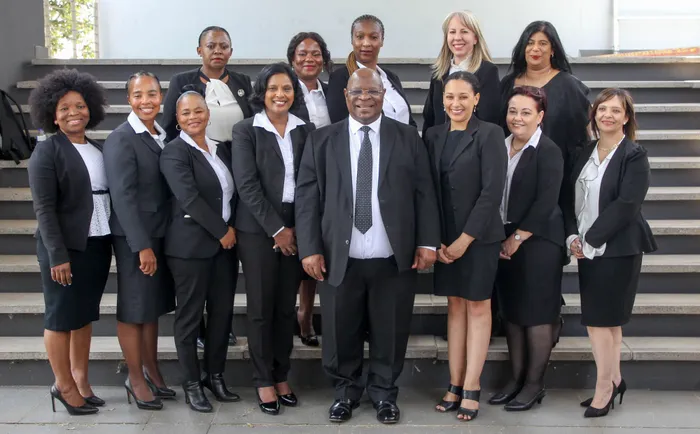Raymond Zondo launches programme to give lawyers, advocates, magistrates right tools to become judges

Chief Justice Raymond Zondo with members of the Aspirant Women Judges Programme. Picture: Jacques Naude/African News Agency (ANA)
Pretoria - With women still being vastly under-represented in judicial positions, especially on the Benches of the courts of South Africa, the Aspirant Women Judges Programme was yesterday launched by Chief Justice Raymond Zondo.
The year-long programme is to give women within the legal system – lawyers, advocates and magistrates – the necessary tools to later become judges.
The programme is implemented by the South African Judicial Education Institution. The entity was established in order to promote the independence, impartiality, dignity, accessibility and effectiveness of the courts through continuing judicial education as provided for in the South African Judicial Education Institute Act.
The purpose of the Aspirant Women Judges Programme is to provide entry level education and training to aspiring female judicial officers to enhance suitability for appointment to judicial office.
Justice Zondo yesterday, during the launch of the programme, remarked that many of the women who are participating in the programme may not necessarily want to advance to the Bench, but the programme will provide them with skills which they can use in practising law.
He also pointed out that it was not a given that those who participated in the programme would automatically be chosen for the Bench, but it would prepare them with the necessary skills for if they applied for these positions.
“We hope that as many as possible will reach the point where they are appointable as judges,” Justice Zondo said.
While at present there is only about 45% female representation on the country’s high court Benches, the chief justice pointed out that there was a big pool to choose from.
The hold-up up to now has been that few women receive the necessary exposure, as it is still a male dominated field.
He commented that state departments still mostly appoint men to do their litigation, although things have improved in this regard.
Justice Zondo also said that it is noticeable that in cases before the Constitutional Court, the senior advocates are mainly men, with some females appearing as their juniors.
The 12-month programme will include a theoretical component – lectures and presentations to be presented by current and retired judges on various topics – as well as a practical component, which involves the placement of the aspirant women judges at various high court divisions for mentorship.
The lead co-ordinator for the programme is retired Judge Phineas Mojapelo.
The 2023 cohort for the programme has 15 candidates, who have at least 12 years’ experience as legal practitioners.
They have been placed in the programme following a selection process that included submission of applications, judgment writing assignments and interviews.
The selection panel consisted of the various judges president of the courts around the country and their deputies.
The women who aspire to the Bench and are chosen for the programme will have to set side a month over the next six months when they will attend lectures and training, which will include the skills in writing judgments.
After six months they will be placed at the various high courts, under the mentorship of the various judges president, where they will observe and interact with the judges.
Justice Zondo explained that their progress will be monitored after the year’s training, so as to assess which candidates had benefited from the programme.
As this is a costly programme, Justice Zondo called on the private sector to become financially involved, because it is to their benefit and to that of the country to have skilled female judges on the Bench.
He said it has taken about 15 years to get this much-needed programme up and running, as one of the biggest challenges was funding.
Justice Zondo dubbed the programme the “Brigitte Mabandla Aspirant Women Judges Programme”, as the former justice minister – now ambassador in Sweden – played an instrumental part in establishing the programme.
Pretoria News